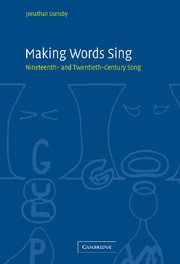Book contents
- Frontmatter
- Contents
- Acknowledgements
- Introduction
- 1 An introduction with no words, with intended words, and untheory
- 2 A love song: Brahms's ‘Von ewiger Liebe’
- 3 Boundless opulence: postscripts on Schoenberg's premonition
- 4 Interlude on peace, laws, flowers, and men flying
- 5 To Amherst via Vienna
- 6 By way of brief conclusion
- Bibliography
- Index
5 - To Amherst via Vienna
Published online by Cambridge University Press: 23 November 2009
- Frontmatter
- Contents
- Acknowledgements
- Introduction
- 1 An introduction with no words, with intended words, and untheory
- 2 A love song: Brahms's ‘Von ewiger Liebe’
- 3 Boundless opulence: postscripts on Schoenberg's premonition
- 4 Interlude on peace, laws, flowers, and men flying
- 5 To Amherst via Vienna
- 6 By way of brief conclusion
- Bibliography
- Index
Summary
A CURIOUS EARTH
Those who know something about the story of Emily Dickinson's life – and there is rather little to know in terms of adventure, life events and the like – tend to invest their natural reverence in place, time, themes. Amherst is the supposedly idyllic American town that through Dickinson became a shrine to poetry and to biographical mystery. The mid nineteenth century knew of trains and kangaroos, that is, of technology beyond the imagination of any one person and of lands beyond the possibility of normal, individual travel, but not, say, of penicillin or of world war. Looking back at the Romantic world, from which emerged art that has subsequently been as enduringly adored as it was urgently nurtured at the time, we need to sense its smaller frames and gentler reference points despite its disquietingly lurking contemporary trends of displacement and ‘chronosis’. And themes – ‘topoi’ as they have sometimes come to be called in recent musicological discourse – are usually indexed as such in the many books of secondary literature on Dickinson's thus rather self-evidently ‘thematic’ poetry, themes that are archetypal, recurrent and arch-Romantic preoccupations of this effulgent poet – love, death, journeys and, not least, heaven itself.
‘Place’ in thinking about Dickinson means not only Amherst but America, and enfolds ideas that have touched the many dozens of composers – mostly ones who in all fairness must be called the minor artists – stimulated creatively by her eerily rhyming (when it does rhyme) ‘verse’.
- Type
- Chapter
- Information
- Making Words SingNineteenth- and Twentieth-Century Song, pp. 115 - 139Publisher: Cambridge University PressPrint publication year: 2004

